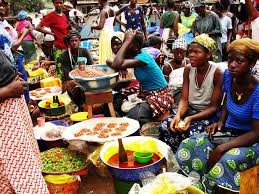Annual inflation in Nigeria accelerated in October to 18.3 percent from 17.9 percent a month earlier, the National Bureau of Statistics (NBS) said on Monday.
A separate index for food rose to 17.1 percent from September’s 16.6 percent, the statistics office said. Nigeria, which has Africa’s biggest economy, is in recession for the first time in more than 20 years.
The recent figure is the country’s highest in 11 years.
The Food Index rose by 17.1 percent (year-on-year) in October, up by 0.47 percent points from 16.6 percent recorded in September. During the month, all major food groups which contribute to the Food sub-index increased with Fruits recording the slowest pace of increase at 11.5 percent.
Price movements recorded by the All Items less farm produce or Core sub-index rose by 18.1 percent (year-on-year) in October, up by 0.4 percent points from rates recorded in September (17.7 percent). During the month, the highest increases were seen in Housing, Water, Electricity, Gas and Other Fuels as well as, fuels and lubricants for personal transport equipment and Education.
Significant price movement under the Core Sub-index was also recorded for Clothing and Footwear, which recorded as increase of 17.8 percent year on year. The groups with least growth pace recorded in October were Communication (5.7 percent), Restaurants and Hotels (9.4 percent) and Recreation and Culture (10.3 percent).
On a month-on-month basis, the Headline index rose by 0.83 percent in October, higher from the rate recorded in September (0.81 percent).
The Urban index rose by 19.9 percent (year-on-year) in October from 19.5 percent recorded in September, and the Rural index increased by 16.95 percent in October from 16.4 percent in September.
On month-on-month basis, the Urban index rose by 0.81 percent in October from 0.79 percent recorded in September, while the Rural index rose by 0.84 percent in October from 0.83 percent in September.
The percentage change in the average composite CPI for the twelve-month period ending in October 2016 over the average of the CPI for the previous twelve-month period was 14.2 percent, higher from 13.5 percent recorded in September.
The corresponding twelve-month year-on-year average percentage change for the urban index increased from 14.4 percent in September to 15.3 percent in October, while the corresponding rural index also increased from 12.6 percent in September to 13.3 percent in October.
Food Index
The Composite Food Index rose by 17.1 percent in October 2016. The rise in the index was caused by increase in prices of Bread and Cereal, Fish, and Meat.
On a month-on-month basis, the Food sub-index increase by 0.86 percent in October from 0.81 percent recorded in September.
The average annual rate of change of the Food sub-index for the twelve-month period ending in October 2016 over the previous twelve-month average was 13.82 percent, 0.58 percent points from the average annual rate of change recorded in September (13.24 percent).
All Items Less Farm Produce
The ‘’All Items Less Farm Produce’’ or Core sub-index, which excludes the prices of volatile agricultural produce increased by 18.1 percent during the month, 0.4 percent points from 17.7 percent recorded in September as all key divisions which contributes to the index increased.
On a month-on-month basis, the Core sub-index rose by 0.75 percent in October, down by 0.21 percent points from 0.96 percent recorded in September. The highest increases were seen in Housing, Water, Electricity, Gas and Other Fuels as well as, fuels and lubricants for personal transport equipment and Education.
The average 12-month annual rate of rise of the index was recorded at 13.76 percent for the twelve-month period ending in October 2016, 0.78 percent points higher from the twelve-month rate of change recorded in September.
President Muhammadu Buhari has repeated his government’s focus is on diversifying the economy to promote exports and grow jobs.
He also aims to increase capital investment in the economy through the fiscal budgetary process to drive growth.
Nigeria was last in a recession, for less than a year, in 1991, and experienced a prolonged one that started in 1982 and last until 1984.
The government has so far disbursed more than 700 billion naira in capital expenditure this year, part of a record 6.06 trillion naira ($30 billion) budget for 2016.














